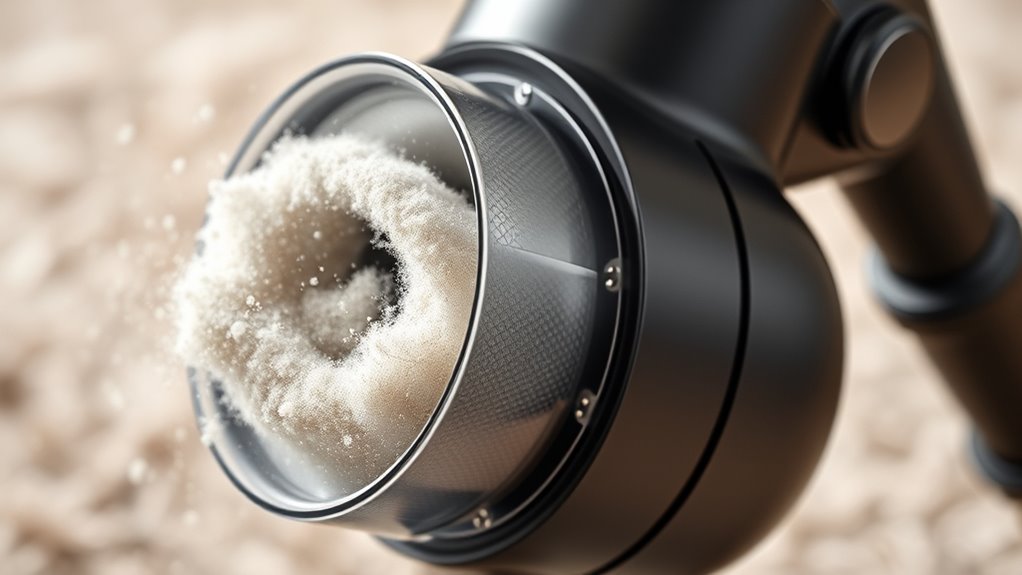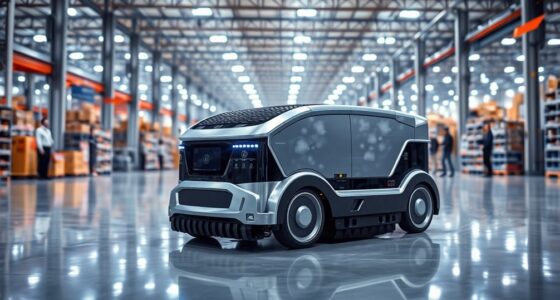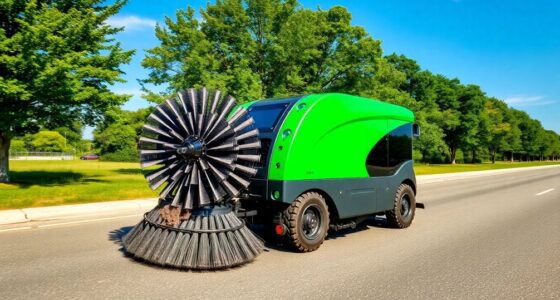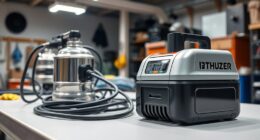HEPA filtration in scrubber-vacuum hybrids captures at least 99.97% of particles as small as 0.3 microns, removing dust, pollen, mold spores, and some bacteria. It guarantees your environment stays cleaner and healthier by preventing airborne pollutants from slipping through. Regular maintenance of these filters is key to keeping the system efficient and extending its lifespan. If you keep exploring, you’ll discover how to optimize HEPA use for maximum air quality benefits.
Key Takeaways
- HEPA filters in scrubber-vacuum hybrids capture at least 99.97% of airborne particles as small as 0.3 microns.
- Regular filter maintenance ensures optimal filtration efficiency and prevents clogging or leaks.
- Proper sealing of HEPA filters in these systems avoids unfiltered air bypassing, maintaining air quality.
- HEPA filtration in hybrid units improves indoor air quality by removing dust, pollen, mold spores, and bacteria.
- Routine inspection and timely filter replacement extend equipment lifespan and ensure continuous high-performance filtration.
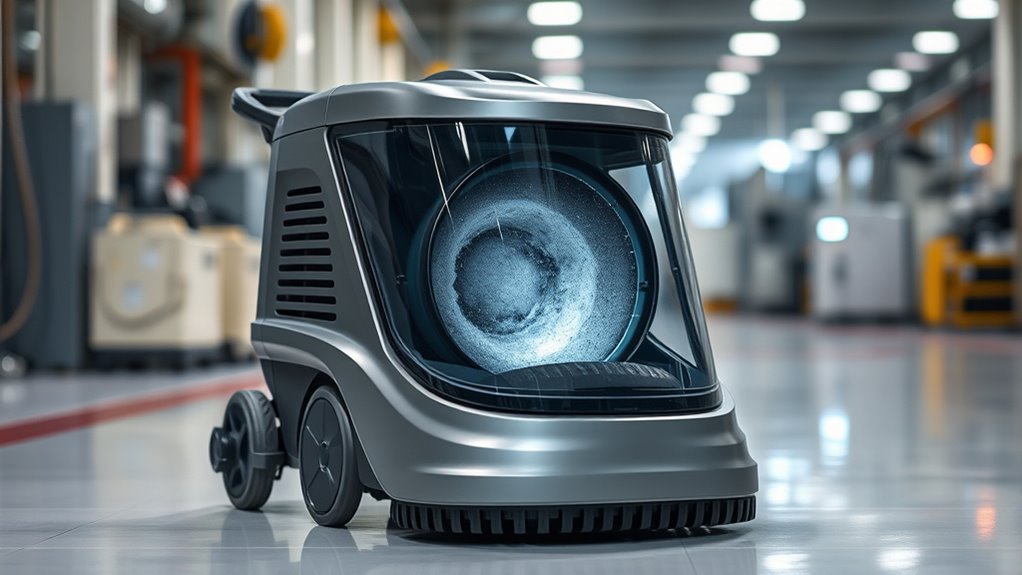
Have you ever wondered how scrubber-vacuum hybrids effectively remove tiny, hazardous particles from the air? These machines use HEPA filtration to trap contaminants that are often invisible to the naked eye. HEPA filters are designed to capture at least 99.97% of particles as small as 0.3 microns, including dust, pollen, mold spores, and even certain bacteria. When you operate a scrubber-vacuum with HEPA filtration, you’re actively improving the air quality in your environment by removing airborne pollutants that could otherwise cause health issues or compromise cleanliness. This makes them especially valuable in settings like hospitals, laboratories, and industrial facilities, where maintaining high air quality standards is critical.
HEPA filters in scrubber-vacuum hybrids capture 99.97% of particles as small as 0.3 microns, ensuring cleaner, safer air.
However, the effectiveness of these machines hinges on proper filter maintenance. Over time, HEPA filters can become clogged with captured particles, which can reduce airflow and decrease filtration efficiency. If you neglect regular filter maintenance, you risk allowing contaminated air to bypass the filter or, worse, causing strain on the vacuum motor. That’s why it’s essential to follow the manufacturer’s guidelines for filter inspection and replacement schedules. Usually, you’ll need to check the filter periodically for dirt buildup and replace it when it becomes visibly dirty or after a certain number of operational hours. Some models feature easy-to-access filter compartments, making routine maintenance straightforward, while others may require more effort. Regardless, keeping the filters clean ensures ideal airflow and prevents loss of suction power.
In addition to replacing filters, you should also ensure that the filtration system is properly sealed. Any gaps or leaks can allow unfiltered air to escape, defeating the purpose of HEPA filtration. Proper filter maintenance not only extends the lifespan of your scrubber-vacuum but also guarantees that the air being expelled is as clean as possible. Regular inspections and filter sealing help prevent unfiltered air from bypassing the system. Remember, a well-maintained filtration system minimizes the risk of airborne contamination and promotes a healthier environment for everyone nearby.
Ultimately, maintaining your HEPA filters is a proactive step toward safeguarding air quality. Regular inspections, timely replacements, and proper sealing help ensure your scrubber-vacuum hybrid performs at its best. This ongoing care maximizes filtration efficiency, reduces operational costs, and provides peace of mind knowing that hazardous particles won’t linger in your air. So, if you want your equipment to serve you reliably and keep the air safe, never underestimate the importance of diligent filter maintenance. It’s the key to harnessing the full benefits of HEPA filtration in your cleaning and air purification efforts.
Frequently Asked Questions
How Often Should HEPA Filters Be Replaced in Hybrid Scrubber-Vacuums?
You should replace HEPA filters in your hybrid scrubber-vacuum every 6 to 12 months, depending on filter lifespan and usage. Regularly check the filter for signs of dirt buildup or damage, and replace it sooner if it looks dirty or clogged. Typically, high-traffic or industrial environments demand more frequent replacements, ensuring maximum filtration performance and maintaining indoor air quality. Always follow your manufacturer’s recommended replacement frequency for best results.
Are HEPA Filters Effective Against All Types of Airborne Contaminants?
Hepa filters are highly effective against many airborne pathogens and provide excellent particle filtration, but they don’t remove all contaminants. They excel at trapping tiny particles like dust, allergens, and bacteria, yet some gases and volatile organic compounds may pass through. For all-encompassing air quality, consider combining HEPA filters with other filtration technologies, especially if you’re dealing with hazardous chemicals or odors.
What Maintenance Is Required to Ensure Optimal HEPA Filter Performance?
You need to regularly inspect your HEPA filter for dirt buildup and damage to guarantee ideal performance. Check the seal integrity to prevent leaks that could reduce filtration efficiency. Replace the filter according to the manufacturer’s recommendations or if you notice a significant drop in suction. Proper maintenance, including timely inspections and replacing filters when necessary, keeps your scrubber-vacuum hybrid operating at peak effectiveness against airborne contaminants.
Can HEPA Filtration in Hybrids Improve Indoor Air Quality Long-Term?
Sure, your hybrid vacuum’s HEPA filter is a superhero for air quality, capturing tiny particles and boosting filtration efficiency. Over time, it can considerably improve indoor air quality, making your environment healthier. Just don’t forget to maintain it properly—clean or replace as needed—so it keeps fighting the good fight. With consistent care, you’ll enjoy cleaner air long-term, proving that even small filters can make a big difference.
Are There Specific Models Best Suited for Hospitals or Sensitive Environments?
Yes, you should look for hospital-grade models designed for sensitive environments. These scrubber-vacuum hybrids feature advanced HEPA filtration, guaranteeing they meet strict air quality standards. They effectively remove airborne contaminants, making them ideal for hospitals, labs, or cleanrooms. When choosing a model, prioritize those with certified HEPA filters and robust build quality to guarantee long-term safety and peak performance in sensitive settings.
Conclusion
By choosing HEPA filtration in scrubber-vacuum hybrids, you’re building a fortress against airborne contaminants. Think of it as your shield in the battle for cleaner air, capturing even the tiniest particles with precision. This technology not only improves air quality but also safeguards your health and environment. Embrace these hybrids as your trusted allies—because when it comes to cleanliness, you want a system that’s as relentless as a guardian, standing firm against invisible threats.
